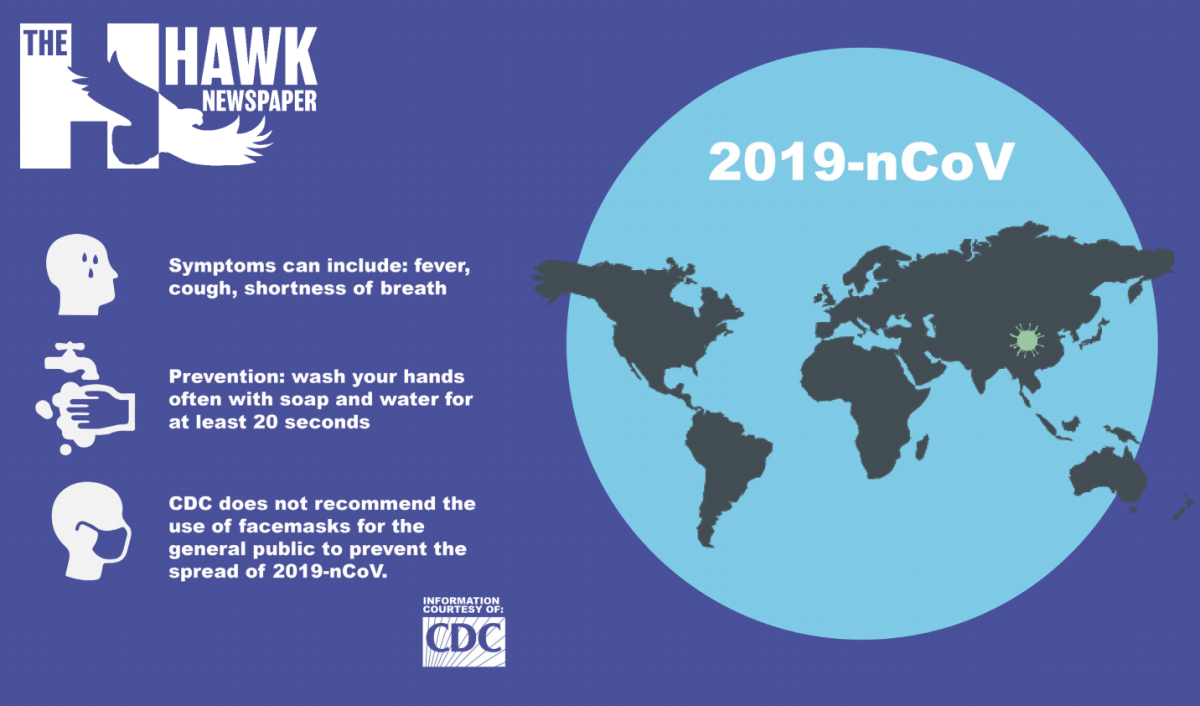At least four Philadelphia-area colleges and universities have decided to cancel spring 2020 study abroad programs to China because of the outbreak of the novel coronavirus from China. St. Joe’s has not yet made a decision about its summer program to China.
The White House issued new travel restrictions on Jan. 31 for passengers arriving from China through major ports of entry to the U.S. The restrictions include a 14-day mandatory quarantine and a complete ban on passengers who visited Hubei province, ground zero for the virus outbreak.
The coronavirus originated in a seafood and poultry market in the city of Wuhan, China on Dec. 31, 2019. At the time of this writing; there were 17,391 confirmed cases of the virus around the world and 361 deaths, including the first death outside of China in the Philippines, according to the World Health Organization (WHO).
Coronaviruses are a large group of viruses which include illnesses like the common cold, according to the Center for Disease Control and Prevention (CDC). The novel coronavirus can be transmitted between humans when an infected person coughs or sneezes, much like other respiratory pathogens.
University of Pennsylvania, Temple University, Villanova University and Drexel University are among the Philadelphia colleges that have so far canceled their spring semester study abroad trips to China.
“Penn currently recommends rescheduling, delaying, or canceling all planned University travel to China between now and the end of the term,” Ron Ozio, director of media relations at University of Pennsylvania, wrote in a statement about the coronavirus. “Penn will be monitoring developments in China and will make decisions about summer travel at a later date.”
St. Joe’s Center for International Programs (CIP) has not yet decided if it will cancel the university’s summer 2020 China study tour, which runs from May 18 to June 2. St. Joe’s does not have any trips to China scheduled for the spring 2020 semester.
James Carter, Ph.D., chair of the history department and coordinator of the China summer study tour, said he is in discussion with CIP about the program but it is “too soon to tell.”
“I’m really hoping that it’s going to run,” Carter said, “but I know that the university has to make decisions consulting with a number of different interests.”
Sarah Haines, assistant director of semester abroad and health & safety, said CIP has not made a decision about the study tour just yet, but the university is heeding travel advisory warnings from the U.S. Department of State.
“We do not sponsor student travel to areas [that have] level 3 or 4 travel advisories,” Haines said in an email to The Hawk.
“While we do not currently have students participating in study abroad programs in China, we are reviewing the evolving situation closely looking ahead to our study tour in May.”
The U.S. Department of State revised its travel advisory for China on Feb. 2 to “Level 4: Do Not Travel due to the novel coronavirus first identified in Wuhan, China.”
“Health risks are present, including current disease outbreaks or crises that disrupt a country’s medical infrastructure,” the U.S. Department of State wrote on its website.
Kelsey Welsh ’22, who is currently enrolled in the China summer study tour, said it’s important to be mindful of the situation while not giving into hysteria. Welsh said she plans to travel to China if the program is approved by St. Joe’s.
“Any disease that allows an entire city to be quarantined should be taken seriously,” Welsh said. “It’s no light matter, but it’s not quite as dangerous as everyone is making it out to be. We’re hoping for the best, but I really hope it doesn’t get cancelled because of this.”

James Garrow, director of communications for the Philadelphia Department of Public Health, said the department agrees with the “Level 4: Do Not Travel” advisory for China issued by the U.S. Department of State, as well as the decision by universities to cancel their study abroad trips to China.
“Given the high number of confirmed cases of the disease, this seems like a logical restriction,” Garrow wrote in an email to The Hawk. “Once the threat to human health ends, these restrictions will be ended.”
Asia Whittenberger ’22, who is enrolled in the China summer study tour, said she thinks it is too early to tell if the study tour should be canceled.
“I think that by the time that we would go to China this would all settle down by then, but it’s just too early to make a decision,” Whittenberger said. “I get that universities are looking out for their students, but at the same time this study tour opportunity is what I’ve been looking for my entire college career so far.”
Zachary A. Klase, Ph.D., associate professor of biological sciences at University of the Sciences, said the universities who have canceled their study abroad trips to China may be worried that students could be affected by the U.S. travel ban against China and will not be able to return to the U.S. amid the crisis.
Klase added the larger threat to public health is not the coronavirus but the flu.
According to the most recent data from the CDC, from Oct. 1, 2019 to Jan. 25, 2020, there were 19 to 26 million flu infections and 10,000 to 25,000 deaths from the flu.
“Even with our vaccination efforts, it kills a fair number of people every year,” Klase said. “What has people scared is that this is the unknown. We haven’t dealt with it before. Cities are closing down, and people are dying, [but] the fatality rate is pretty low.”

















































